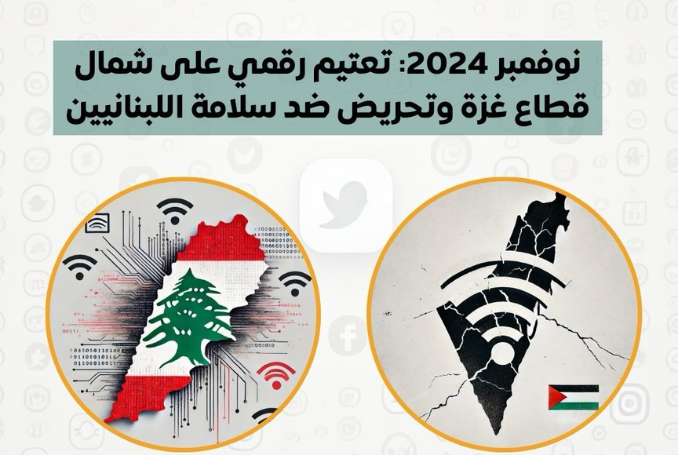
These actions, the organization stated, reinforce “digital policies that suppress Palestinian voices and limit their reach to audiences.”
Sada Social, an organization focused on documenting digital rights violations against Palestinian content online, reported more than 500 incidents in November, the Anadolu News Agency reported.
The group’s monthly report highlighted widespread digital suppression across various platforms.
Violations on Meta platforms made up 57% of the total, followed by TikTok at 23%, YouTube at 13%, and X at 7%.
Furthermore, 30 WhatsApp accounts owned by Palestinians were deactivated, including two news groups.
These actions, the organization stated, reinforce “digital policies that suppress Palestinian voices and limit their reach to audiences.”
November 2024: Digital Blackout in Northern Gaza and Incitement Against Lebanese Safety
November 2024 witnessed a significant escalation in digital violations against Palestinian content, as Sada Social Center for Digital Rights documented over 500 violations across various… pic.twitter.com/7d5Enrse41
— صدى سوشال – Sada Social (@SadaSocialPs) December 3, 2024
It also pointed out that a persistent “digital blackout” in northern Gaza has “severely hindered residents’ ability to communicate.”
The internet outage has obstructed locals from reporting on current events and humanitarian conditions, the report added.
Sada Social urged digital platforms to tackle inciting content and called on stakeholders to adopt measures to address policies that “exacerbate” humanitarian and political crises.
Systemic Censorship
Several reports throughout the years highlight systemic issues related to censorship, surveillance, and discrimination in online spaces against Palestinians or pro-Palestinian content.
Last December, Human Rights Watch accused the social media giant Meta of “systemic censorship” of Palestine content on both Instagram and Facebook.
In a report issued on December 20, 2023, HRW said that “Meta’s content moderation policies and systems have increasingly silenced voices in support of Palestine on Instagram and Facebook in the wake of the hostilities between Israeli forces and Palestinian armed groups”.
According to HRW, “the problem stems from flawed Meta policies and their inconsistent and erroneous implementation, overreliance on automated tools to moderate content, and undue government influence over content removals.”
Meta Applies ‘Systemic Censorship’ of Palestine Content – HRW
Deborah Brown, acting associate technology and human rights director at Human Rights Watch, stated that “Meta’s censorship of content in support of Palestine adds insult to injury at a time of unspeakable atrocities and repression already stifling Palestinians’ expression.”
The New York-based human rights group reviewed 1,050 cases of online censorship from over 60 countries and it has identified “six key patterns of censorship, each recurring in at least 100 instances: content removals, suspension or deletion of accounts, inability to engage with content, inability to follow or tag accounts, restrictions on the use of features such as Instagram/Facebook Live, and shadow banning’,”.
The term ‘shadow banning’ denotes “a significant decrease in the visibility of an individual’s posts, stories, or account without notification.”
According to HRW, “Meta also misapplied its policies on violent and graphic content, violence and incitement, hate speech, and nudity and sexual activity.”
This is not the first time Meta has been accused of censoring Palestine-related content.
“Meta is aware that its enforcement of these policies is flawed,” HRW said. “In a 2021 report, Human Rights Watch documented Facebook’s censorship of the discussion of rights issues pertaining to Israel and Palestine and warned that Meta was silencing many people arbitrarily and without explanation’.”
One day before HRW issued its report, Meta’s oversight board declared that the social media giant, formerly known as Facebook, made an error in removing two videos depicting hostages and casualties during Israel’s military onslaught against Palestinians in Gaza.
“Instead of tired apologies and empty promises, Meta should demonstrate that it is serious about addressing Palestine-related censorship once and for all by taking concrete steps toward transparency and remediation,” Brown said.
(The Palestine Chronicle)
